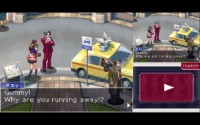Ace Attorney Investigations
Investigations 1 Playtime: 17.8 Hours
Finished 24 March 2023.Investigations 2 Playtime: 29 Hours
Finished 03 April 2023.Since Investigations 2 (Gakuten Kenji 2) was never officially localized, I used a fan-made English translation. I think it's very good; I almost can't tell that it's not an official translation, other than the fact that it did use pop culture references a little bit more than the other officialy localized Ace Attorney games. GK2 also has an anti-piracy measure which turns all text into Borginian, but the English patch also had a fix for that so I never got to see it for myself. Starting from Case 3, the flashcart would bug out every time I tried to save the game, so I ended up finishing it on the Steam Deck instead - all the screenshots are from the second half of AAI2.
The Investigations games are very similar to the mainline Ace Attorney games, with most differences being very superficial. You play as Edgeworth and are supposedly doing your duty as a prosecutor, but the flow of each case is still the same, alternating between Investigation and Testimony stages. Testimonies are now generally organized into shorter bouts called "arguments", but they all use the same pressing and presenting mechanics as in the other games. The actual investigations now represent Edgeworth actually on the screen in a 2.5D style, but you still interact with the same kinds of objects in general. Each case technically ends with the arrest of the primary suspect (after Edgworth manages to make them all confess), but there are no actual courtroom segments to play out afterward. For all aspects of this game that are ultimately mechanically identical to the mainline Ace Attorney games, my opinions are the same as those stated for those games - so it's pointless to repeat them.
Instead, I'll focus on the things that are actually different - a few mechanically, but most from the plot, which is obviously a big departure from the other games. Mechanically, the only significant addition is the Logic mechanic, wherein some investigation pieces will grant logic prompts instead of evidence. These logic prompts can be paired together over the course of a case to deduce important clues about a piece of evidence, or sometimes to trigger important conversations. From my experience with the first Investigations game, a few of these tend to be somewhat obtuse (there is only a single correct answer, even if "logically" multiple connections actually make sense) but lots of them are relatively obvious. I think it's a really cool mechanic; given that each character kind of has their own "mechanic" so to speak, this would be Edgeworth's specialty (compared to Phoenix's magatama, Apollo's bracelet, or Athena's Mood Matrix).
Plotwise, the first Investigations game takes on quite a different structure to the Ace Attorney Trilogy. While Phoenix's cases tend to be far more spread out, across months or even years, the entirety of AAI takes place within just a couple of days (save Case 4, which is a flashback) and all of the cases are very tightly connected into a single plot involving a smuggling ring. Familiar characters are encountered across all of the cases, and it feels a little more natural in Investigations because of the temporal proximity of each event. Edgeworth's new assistant, Kay Faraday, is pretty much how Maya is to Phoenix in the trilogy - it tries to recapture that same chemistry, and in my opinion it works fairly well. Kay's naive, goofy nature is a great foil to Edgeworth's inherent seriousness, and her inherent silliness provides an interesting contrast in humor to Gumshoe's clumsiness. She also provides some very important context as a key player in the story, which revolves around a smuggling ring and the sudden re-emergence of a "Great Thief" known as the Yatagarasu, of whom Kay claims to be the true descendant.
Most of the cases range from decent to great - AAI's cases tend towards the shorter side, but they're interesting and contain a good complement of twists. The only real complain I have is that the end of the final case suffers extremely heavily from the "boy who cried wolf" syndrome; the ultimate villain warns you probably at least 10 times (no exaggeration) that you're on your last chance, just for the game to drag on for another 2-3 hours. I really wish the writers would be able to recognize these kinds of issues and edit them out; given how obvious the situation and villain is, the game is really clearly just dragging its feet to the finish line in order to get a playtime over 15 hours. It's certainly something to see the arguments and testimonies devolve further and further into a nonsensical mess; note that with all the final gotchas that they insist on adding, the last pieces of proof that seal the mastermind's fate are actually hardly definitive. They could have actually kept going if they wanted to, which just seems absurd to me. It's very obvious to me that they didn't really do any edition for that portion of the case, and just threw all of the writers' drafts into the game regardless of quality. I actually considered quitting about halfway through, but just ended up paying attention to other stuff while riding out the last segment instead, which left a pretty awful taste in my mouth. Hopefully AAI2 isn't like this too.
Investigations 2
This game is very similar to the previous game in terms of structure and completely identical mechanically, which isn't a complaint - I really like the games in this format; even if the fundemental mechanics end up being pretty superficial, it's at least nice to explore lots of different scenery instead of spending half the game sitting in a courtroom. That said, I can't help but feel like this game is weaker than the first Investigations game. It tries to both continue the story of Investigations 1 while inventing a new issue specific to this story, and ends up with a muddled mix of plot threads from which a single ending must be manufactured. Unlike Investigations 1, which is able to tie the character and plot threads nicely into the smuggling ring incident, this game first focuses on a presidential assassination attempt, then introduces a weak P.I.C. corruption subplot (which ends well - but for the first couple of cases has no teeth), and finally finishes with a contrived-feeling final case, where some throwaway character I didn't care about is apparently some mastermind. It feels like a ProZD video.
To continue with the issues I have with this game, I feel like Kay's storyline just doesn't quite fit well into this one. Unlike the smuggling ring case, where she was very intimately involved, she only happens to get involved with the plot in this one mostly by chance; the whole Yatagarasu character feels out of place because it has no story relevance anymore. This game just sorely lacks a strong tie-in for any character other than Edgeworth, who is the one with a personal stake in this game because of Gregory's old case; Kay doesn't have her father nor the Yatagarasu to chase, and Gumshoe doesn't have a chance to encounter Detective Badd and is actually shoved pretty heavily out of the majority of the case unfortunately. Also, as mentioned earlier, I find the PIC subplot really weak because the entire threat revolves around taking Edgeworth's badge away - but Edgeworth already establishes that he is hunting for truth and doesn't care about the badge... every instance afterwards where Courtney uses the same tired threat just doesn't really have any impact. Combined with the incompetent Debeste, the pair just feel like the two stooges that just exists to waste time.
On the other hand, there is still no shortage to great details in this game. There are some great side characters in this game; I quite like Di-Jun Huang and the discovery of the body double is a really cool moment. Raymond Shields is a great character with a fantastic theme, and induces some of the most profound growth in Edgeworth's character in the series. The third case, the Inherited Turnabout, is by far my favorite in the game; old man Edgeworth is an awesome character, going up against Von Karma in peak form. Jeff Master is an interesting character, and Katherine Hall being the culprit of the poisoning was a pretty surprising turn of events; she also has the best nervous/sweating animation maybe ever and is really cute in general. I suppose my headcanon is that she ends up with Raymond down the line. From the last 2 cases, Blaise Debeste is a great, hateable villain, whose only downside is how annoying the goggles draining animation is, and as much as I don't really like Sebastian in the early parts of the game, I appreciated his growth by the end, and he at least had a pretty cool moment where he finally takes down his own father.
The last case is also generally pretty good - I found the mystery very intriguing and fun to unravel - but I feel like it tries to close far too many plot threads at once for all of the characters. Given how much of it is coincidence, it just ends up looking completely like an ending completely restricted by a limit on the size of the game. I think this game could have been rounded out better with another case or 2. The mastermind reveal was also kind of lame; it's pretty easy to deduce if you just get into the writers' heads a bit and consider the most innocuous character that just happens to be in the last case. Thankfully, his interrogation doesn't drag nearly as long as Alba's in Investigations 1 - his character overall just doesn't hit the same par. I'd consider the Grand Turnabout to be slightly worse than Turnabout Blaze in general.
My closing thoughts on the series are that it's an interesting take on the Ace Attorney games and a rare chance to play on the "opposing side" as a prosecutor rather than a defense attorney, but the games really don't differentiate themselves enough mechanically to make that decision meaningful. You're still defending the wrongly accused and hunting for the real culprit, just like Phoenix, Apollo et. al. do in their respective trials. Really, what actually makes these games shine is the roster - Edgeworth, Gumshoe, and Kay form an interesting dynamic similar to Phoenix and Maya, or Apollo and Trucy. Other great side characters like Badd and Lang make the cases memorable, and the plotlines taking place rapid-fire over the course of days rather than months produces a sense of urgency in the case without resorting to stupid courtroom rules like the 3-day limit.



























